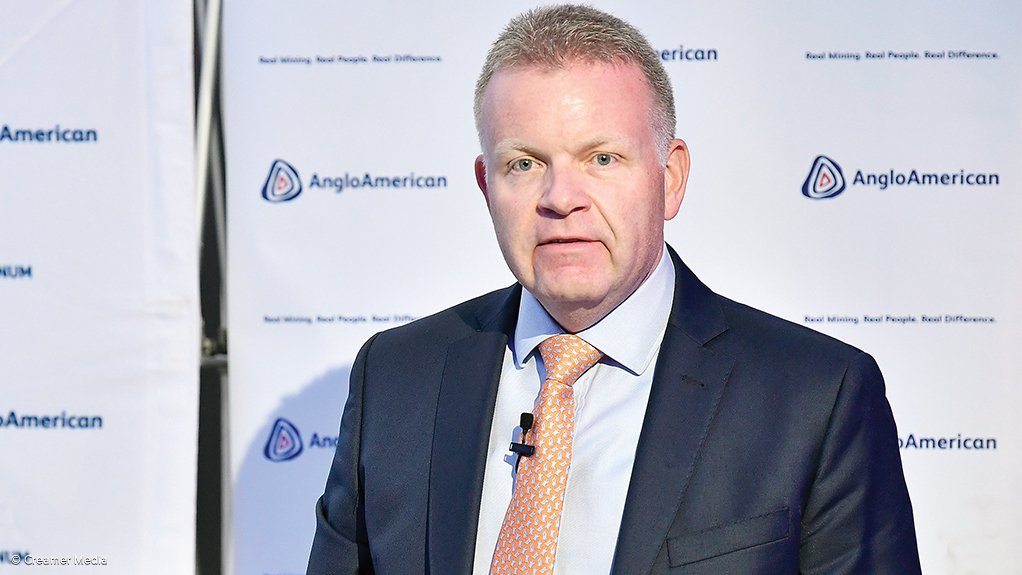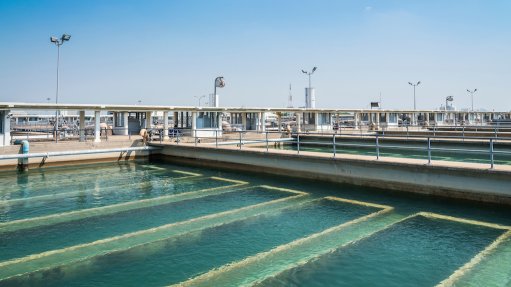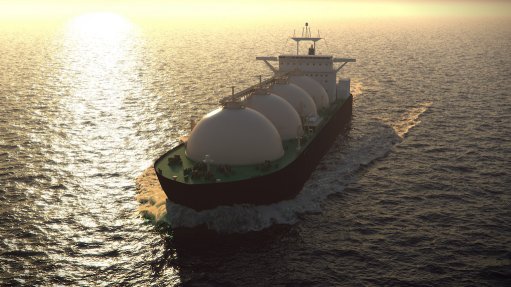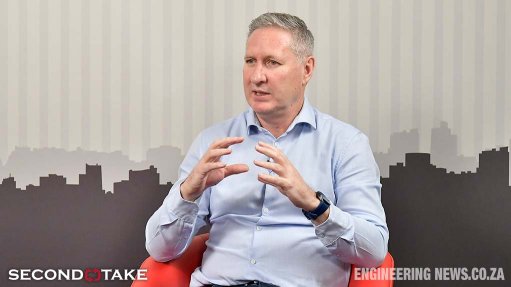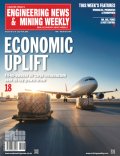Amplats restructuring may impact 3 700 jobs after 71% y/y earnings decline
Despite the “extensive measures” already taken by platinum group metals (PGMs) miner Anglo American Platinum (Amplats) to ensure its survival, the company has announced a proposed restructuring process in terms of Section 189A of the Labour Relations Act.
This comes on the back of a 71% year-on-year decline in Amplats’ headline earnings to R14-billion for the 2023 financial year.
The proposed restructuring could impact 3 700 jobs, including those of fixed-term employees, across the company’s South African operations.
The Section 189A process involves a consultation period with trade unions and affected employees and will be facilitated by the Commission for Conciliation, Mediation and Arbitration. Only when the consultation process is concluded will the final number of impacted jobs be known, CEO Craig Miller said on February 19.
“What we've announced today is absolutely the last resort. It weighs very heavily on us. We certainly don't take the decisions that we've made lightly,” he said.
Amplats has simultaneously initiated a contractor and vendor review process that could impact about 620 service providers and contractors. The company said this review could result in the renegotiation of certain contract terms and scope, as well as the non-renewal of contracts when they expire. It could also result in the outright termination of other contracts within the contractual provisions.
“We responded rapidly throughout 2023 and are working hard to reposition the business to address both the global and local challenges that currently face the PGM industry.
“It is clear to us, however, that the extensive range of actions we have already taken do not go far enough. After working through all the options, it is apparent that further measures to create critical resilience and greater competitiveness are needed to sustain the business,” Miller said.
He said the company understood the negative socioeconomic impact that this process would have on employees, their families and communities.
“These actions are necessary to enable the continued employment of thousands of workers and contractors and to share value with our host communities, pay taxes and royalties to governments as well as procure goods and services from local suppliers,” Miller reasoned.
As Amplats progresses with the implementation of the Section 189A process, it will put in place an appropriate wellbeing support programme to support affected individuals and initiate comprehensive social impact mitigation measures.
“I don't take the decision of this restructuring very lightly at all. I'm acutely aware of the impact that it has. But we need to look forward and we need to make sure that the remaining 18 000 people that will be part of the organisation going forward are motivated, engaged, and particularly focused on delivering both safe, stable and capable production for many years to come,” Miller told Mining Weekly.
He said that he remained optimistic about the long-term demand for PGMs and the important role they play in a more sustainable and environmentally friendly global economy.
“While navigating the prevailing macro uncertainties, we continue to take the necessary steps to ensure the long-term viability and competitive position of the business and remain committed to our strategic priorities,” Miller said.
PRODUCTION
For the year under review, Amplats reported a 5% decrease in PGM production from its self-managed mines, mainly owing to planned infrastructure closures at Amandelbult, poor ground conditions at Dishaba and expected lower grades at Mogalakwena.
The company said the lower production was marginally offset by increased production from Unki, in Zimbabwe.
The disposal of Amplats’ 50% interest in Kroondal became effective on November 1, 2023, resulting in Kroondal transitioning to a 100% third-party purchase-of-concentrate arrangement.
Refined production was 1% lower year-on-year, primarily owing to lower metal-in-concentrate production and the impact of Eskom load curtailment of about 82 000 oz PGMs. This was offset by the release of concentrate stocks.
Meanwhile, sales volumes increased by 2% owing to the drawdown in refined stock.
However, Amplats’ realised dollar basket price fell by 35% in 2023 to $1 657/oz PGMs, which was the lowest level since 2019. Miller said this reduction was predominately caused by a decline in palladium and rhodium metal prices, which reduced by 37% and 58%, respectively.
The decrease in price, combined with higher costs, which were a result of above-inflation energy costs, increased drilling activities and higher labour and mechanical spare costs, were the main drivers of earnings before interest, taxation, depreciation, and amortisation (Ebitda) declining by 67% to R24-billion with a mining Ebitda margin of 35%.
Amplats ended the year in a net cash position of R15-billion, including customer prepayments of R11-billion.
PAYOUTS
Despite the poor performance, the Amplats board has declared a final 2023 dividend of R9.30 a share, or R2.5-billion. This brings the total dividend declared for 2023 to R21.30 a share or about R6-billion, equivalent to a 40% payout of headline earnings.
These dividends would be paid to all shareholders, including R150-million to employees through Amplats’ employee ownership scheme Thobo and to the community ownership scheme trusts.
In addition, the Amplats executive team all received increased cash bonuses for 2023 over those of 2022. However, Miller told Mining Weekly that this increase in bonus pay-outs was attributed to the bonuses in 2022 being impacted by a malus adjustment that was made as a consequence of a fatality which took place in 2021.
As it stands, Miller’s bonus for the year went from R4.8-million in 2021 to R3.6-million in 2022, jumping back up to R5.5-million in 2023. Other executive's bonuses followed a similar trajectory.
“Although earnings were down 71%, a large proportion of that decline was driven by factors outside of our control. I am unable to control price, but what I am able to control is the safety in our organisation, our production, and how we manage and set the business up for the future. Those are key elements that were reviewed when awarding bonuses for 2023,” Miller said, adding that it was necessary to ensure remuneration packages for top executives were competitive in a global skills market.
TURNAROUND
Miller said its results for the 2023 financial year were coloured by suppressed PGM prices, coupled with significant cost pressures and an uncertain outlook, which necessitated further intervention to ensure the long-term sustainability and competitive position of its operations.
The action plan, which was initially outlined in December 2023, encompasses a variety of measures, including embedding sustainable cost reduction initiatives that are expected to deliver a R5-billion a year in cost savings from a 2023 baseline.
Amplats explained that stay-in business capital would also be reduced without compromising asset integrity, while development capital will be rephased to still support value adding long-term growth optionality from our world class mineral endowment.
These measures are expected to result in cash operating unit costs of between R16 500/oz and R17 500/oz of PGMs this year, as well as a targeted all-in sustaining cost (AISC) of about $1 050/oz of platinum, palladium and rhodium (3E) PGMs.
“We've also then needed to reduce costs and to improve productivity, since we've seen our productivity levels decline. As such, part of the restructuring is restoring those productivity levels back to where they have been in the past,” Miller explained.
He highlighted Amplats’ intentional strategy at the concentrators to produce higher-grade concentrate. This produces the same PGM content at lower concentrate throughput volume, which has the benefit of reducing required primary furnace capacity and allows the company to place the Mortimer smelter on care and maintenance, thereby reducing operating costs, capital expenditure and enhancing overall processing competitiveness.
Miller said studies are under way to convert the smelter to slag cleaning duty with an appropriate sulphur dioxide abatement solution in the medium term that would enable processing of historical converter slag tails, which could unlock further value.
The company expects metal-in-concentrate and refined production to be between 3.3-million and 3.7-million PGM ounces in 2024, while the unit cost is forecast to be between R16 500/oz and R17 500/oz PGMs.
Additionally, Miller said total capital expenditure of between R19-billion and R19.5-billion is expected. Amplats is also targeting a reduction in AISC of below about $1 050/oz of 3E this year.
Miller explained that platinum is expected to remain in a small deficit over the next few years, as automotive demand remains robust and owing to some ongoing substitution of palladium in gasoline catalysts.
In addition, palladium is also expected to be in deficit again this year, but then move into a surplus from next year on as automotive demand is curbed by the shift to battery electronic vehicles and recycling volumes improve. Miller also expects rhodium to move into surplus from 2025.
“We really are excited about the fundamentals for PGMs in the long term,” Miller reassured.
He reiterated that he believed that Amplats owned some of the best PGM assets there are in the industry.
“PGMs are located in South Africa and so our view and the capital discipline that we have as a business is really to focus on investment in our existing assets and the best in class performance from them, given the opportunity that they present. They’re tier one, they’re long life, and we need to make sure that we operate them in the lower half of the cost curve,” Miller said.
Comments
Press Office
Announcements
What's On
Subscribe to improve your user experience...
Option 1 (equivalent of R125 a month):
Receive a weekly copy of Creamer Media's Engineering News & Mining Weekly magazine
(print copy for those in South Africa and e-magazine for those outside of South Africa)
Receive daily email newsletters
Access to full search results
Access archive of magazine back copies
Access to Projects in Progress
Access to ONE Research Report of your choice in PDF format
Option 2 (equivalent of R375 a month):
All benefits from Option 1
PLUS
Access to Creamer Media's Research Channel Africa for ALL Research Reports, in PDF format, on various industrial and mining sectors
including Electricity; Water; Energy Transition; Hydrogen; Roads, Rail and Ports; Coal; Gold; Platinum; Battery Metals; etc.
Already a subscriber?
Forgotten your password?
Receive weekly copy of Creamer Media's Engineering News & Mining Weekly magazine (print copy for those in South Africa and e-magazine for those outside of South Africa)
➕
Recieve daily email newsletters
➕
Access to full search results
➕
Access archive of magazine back copies
➕
Access to Projects in Progress
➕
Access to ONE Research Report of your choice in PDF format
RESEARCH CHANNEL AFRICA
R4500 (equivalent of R375 a month)
SUBSCRIBEAll benefits from Option 1
➕
Access to Creamer Media's Research Channel Africa for ALL Research Reports on various industrial and mining sectors, in PDF format, including on:
Electricity
➕
Water
➕
Energy Transition
➕
Hydrogen
➕
Roads, Rail and Ports
➕
Coal
➕
Gold
➕
Platinum
➕
Battery Metals
➕
etc.
Receive all benefits from Option 1 or Option 2 delivered to numerous people at your company
➕
Multiple User names and Passwords for simultaneous log-ins
➕
Intranet integration access to all in your organisation



